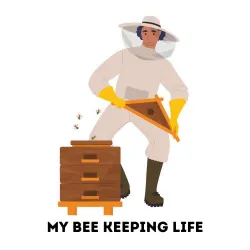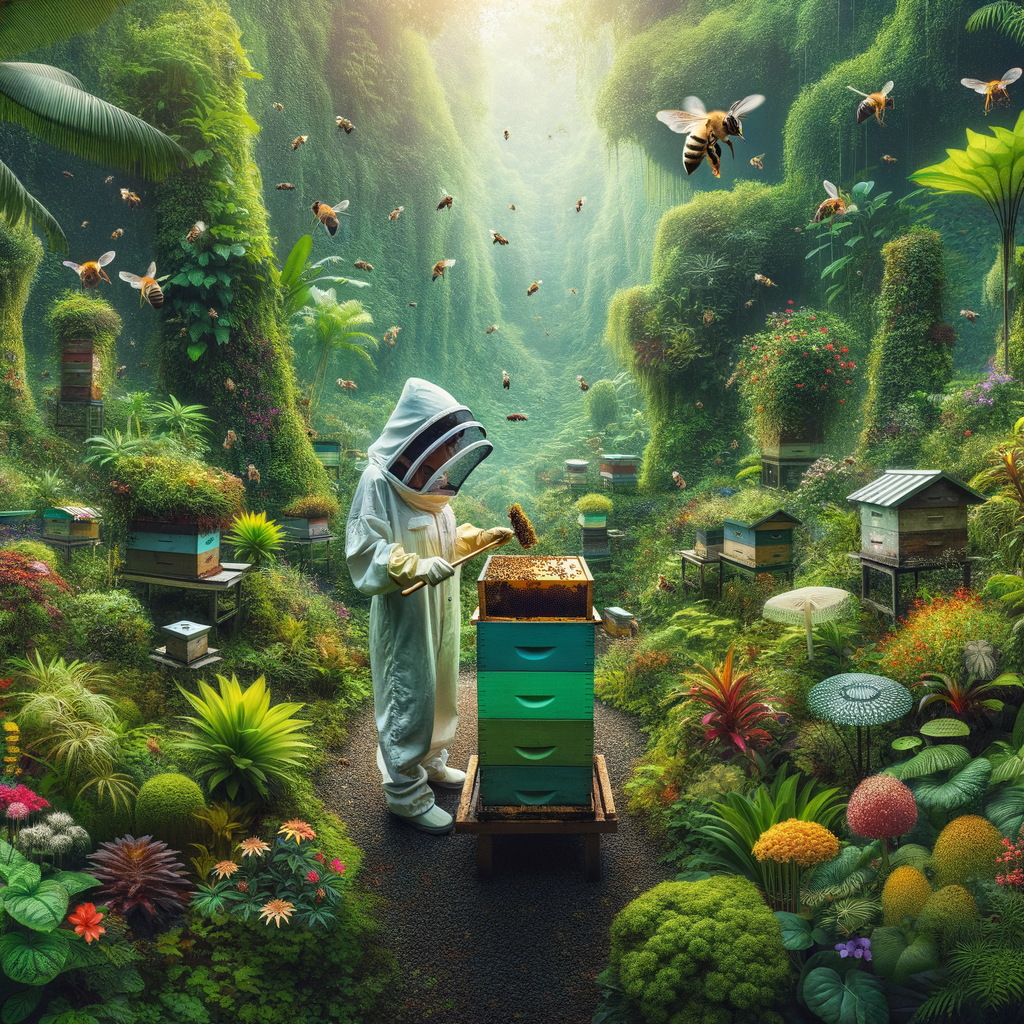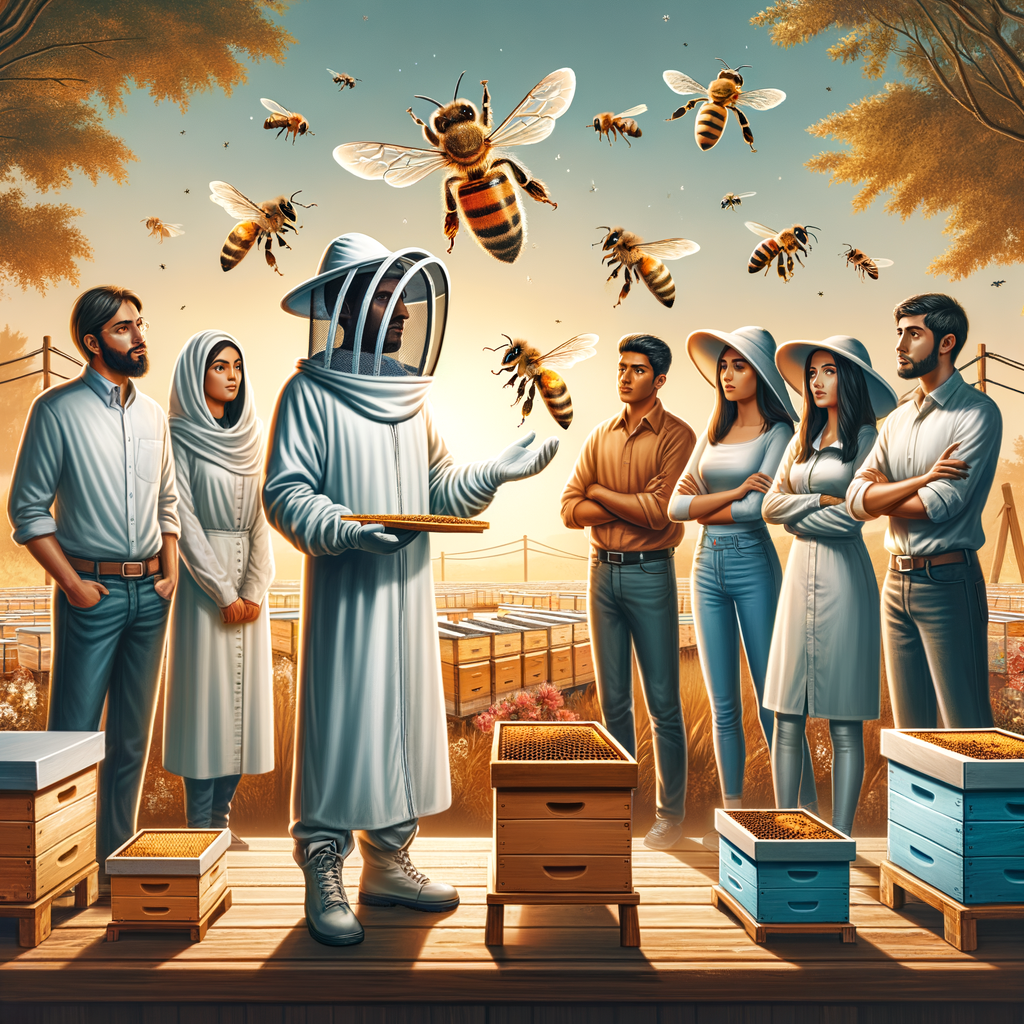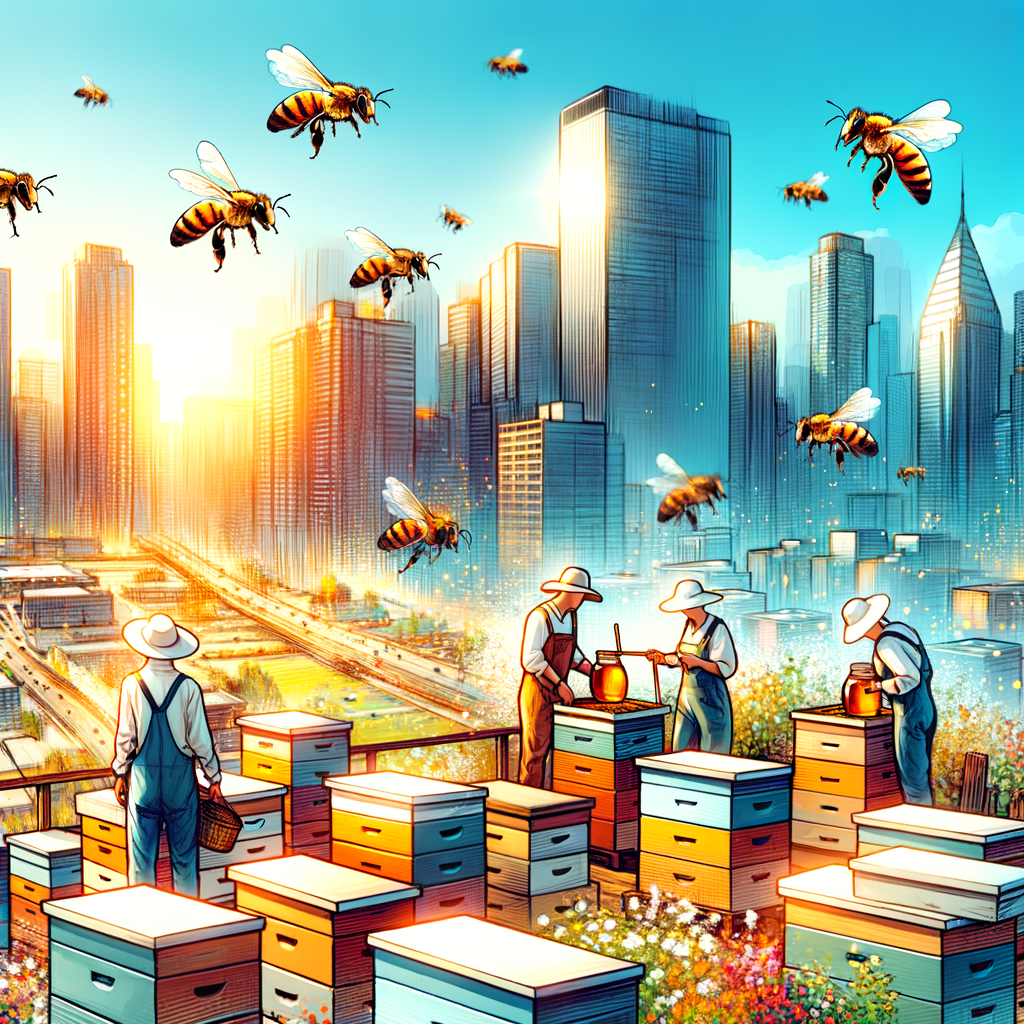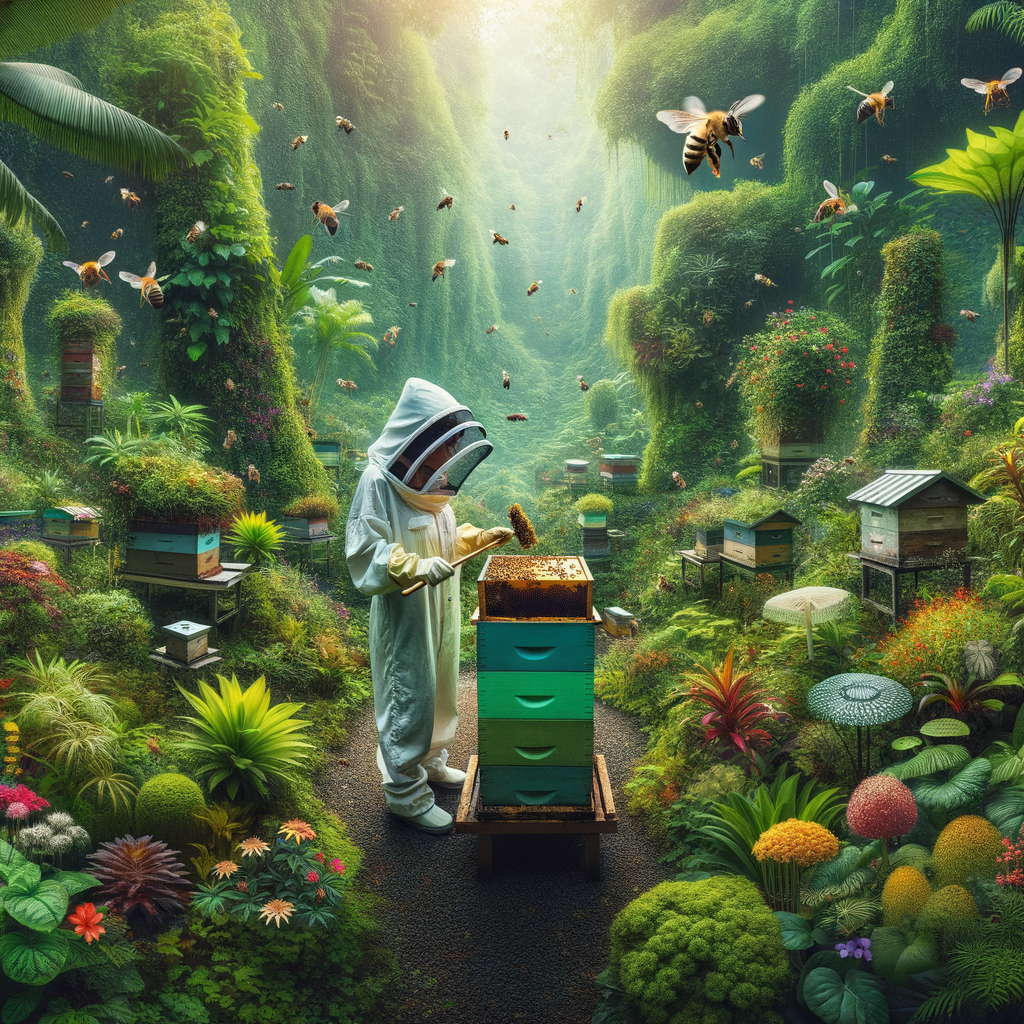
Introduction to Beekeeping and Biodiversity
Welcome to the fascinating world of beekeeping and biodiversity. This introductory section will help you understand the basics of these two important concepts and their significance in our world today.
-
- Definition of Beekeeping
Beekeeping, also known as apiculture, is the practice of maintaining bee colonies in man-made hives. This is usually done by humans. Beekeepers, or apiarists, manage hives to collect honey and other products like beeswax, pollen, and royal jelly. They also provide pollination services to fruit and vegetable crops, contributing to our food supply.
-
- Definition of Biodiversity
Biodiversity refers to the variety of life on Earth. It includes all the different species of plants, animals, and microorganisms, the genetic differences among them, and the complex ecosystems they form. Biodiversity is vital as each species plays a crucial role in maintaining the balance of our planet’s ecosystems.
-
- Importance of Biodiversity
Biodiversity is important for many reasons. It provides us with a variety of foods and materials and contributes to the economy. Many medicinal drugs that we use today are derived from wild species. Biodiversity also helps in maintaining the health of ecosystems. For example, different species contribute to soil fertility, waste decomposition, and water purification. Moreover, biodiversity makes our ecosystems more resilient, allowing them to withstand disturbances and recover from disasters.
Now that we have a basic understanding of beekeeping and biodiversity, let’s delve deeper into how these two concepts intertwine and their significance in conservation efforts.
Conservation through Beekeeping
Bees play a vital role in the ecosystem, and beekeeping is a practice that helps to conserve biodiversity. In this section, we will explore how beekeeping contributes to conservation and look at a case study that illustrates its success.
-
- How Beekeeping Contributes to Conservation
Beekeeping, also known as apiculture, is the maintenance of bee colonies in man-made hives. It contributes to conservation in several ways:
-
-
- Pollination: Bees are essential pollinators, helping plants to reproduce. Without bees, many plant species would struggle to survive, which would have a knock-on effect on the rest of the ecosystem.
- Biodiversity: By helping plants to reproduce, bees increase biodiversity. A greater variety of plants means a greater variety of habitats for other creatures, leading to a more diverse ecosystem.
- Food production: Many of the foods we eat rely on bees for pollination. By keeping bees, we help to secure our food supply.
- Case Study: Successful Conservation through Beekeeping
-
Let’s look at a real-life example of how beekeeping can lead to successful conservation. In the Brazilian Amazon, a project was launched to introduce beekeeping to local communities. The aim was to provide an alternative source of income to logging, which is a major cause of deforestation.
After five years, the project was a success. Not only did it provide a sustainable source of income for the communities, but it also led to a decrease in logging. As a result, the local ecosystem was preserved, demonstrating the power of beekeeping as a tool for conservation.
It’s a powerful tool for conservation, helping to maintain biodiversity and protect our ecosystems. As the case study shows, it can also provide sustainable livelihoods for communities, reducing the need for harmful practices like logging.
| Aspect | Contribution to Conservation |
|---|---|
| Pollination | Helps plants to reproduce, supporting biodiversity |
| Biodiversity | Creates a variety of habitats for other creatures |
| Food Production | Secures our food supply by pollinating many of the foods we eat |
| Case Study | Shows how beekeeping can provide sustainable livelihoods and protect ecosystems |
Role of Beekeeping in Ecosystem
Understanding the role of beekeeping in our ecosystem is crucial to appreciating its importance. This section will delve into how bees contribute to ecosystem balance and the impact of beekeeping on ecosystem health.
-
- How Bees Contribute to Ecosystem Balance
Bees play a significant role in maintaining the balance of our ecosystem. As pollinators, they are responsible for assisting in the growth of trees, flowers, and other plants, which serve as food and shelter for creatures large and small. Bees transfer pollen between the male and female parts of a flower, allowing plants to grow seeds and fruit.
According to a study by the United Nations, nearly 75% of the world’s crops that produce fruits and seeds for human consumption depend, at least in part, on pollinators. This highlights the critical role bees play in our food production and overall ecosystem balance.
-
- Impact of Beekeeping on Ecosystem Health
Beekeeping, also known as apiculture, has a direct and positive impact on ecosystem health. By maintaining bee colonies, beekeepers help ensure that these vital pollinators can continue their work. This is particularly important given the recent declines in wild bee populations due to habitat loss, pesticides, and climate change.
Moreover, beekeeping promotes biodiversity as bees pollinate a wide variety of plants. The more diverse a community of plants, the more resilient the ecosystem is to threats like disease, pests, and climate change. Therefore, beekeeping can be seen as a form of environmental conservation.
By understanding and supporting their role, we can contribute to biodiversity conservation and ensure the sustainability of our natural environment.
Beekeeping for Biodiversity Preservation
Beekeeping, also known as apiculture, is a practice that has been around for thousands of years. It involves the maintenance of bee colonies in man-made hives. But did you know that this ancient practice can also play a crucial role in preserving biodiversity? Let’s explore how.
-
- How Beekeeping Helps Preserve Biodiversity
Beekeeping contributes to biodiversity preservation in several ways. Bees are known as pollinators, which means they help plants reproduce. Without bees, many plants, including those that produce the food we eat, would struggle to survive.
When beekeepers maintain healthy bee colonies, they help ensure a robust population of these vital pollinators. This, in turn, supports a diverse ecosystem. Bees pollinate a wide variety of plants, contributing to the growth of different species and thus, enhancing biodiversity.
Moreover, beekeeping encourages the preservation of green spaces. Beekeepers need areas rich in flora for their bees to forage. This need helps protect these areas from deforestation and urbanization, preserving habitats for various species and promoting biodiversity.
-
- Case Study: Biodiversity Preservation through Beekeeping
Let’s consider a real-world example to understand the impact of beekeeping on biodiversity preservation. In the Brazilian Amazon, a project was initiated to promote beekeeping among local communities. The aim was to provide them with a sustainable livelihood and discourage practices like logging and farming that lead to deforestation.
The project was a success. It not only provided a source of income for the communities but also helped preserve the rich biodiversity of the Amazon rainforest. The presence of bees led to increased pollination, which resulted in a more diverse and resilient ecosystem. This case study clearly demonstrates how beekeeping can be a powerful tool for biodiversity preservation.
It’s a practice that supports biodiversity and helps maintain the health of our ecosystems. By understanding and promoting the role of beekeeping in biodiversity preservation, we can contribute to a more sustainable and diverse planet.
Importance of Beekeeping in Conservation
Bees are more than just honey producers; they are vital contributors to our ecosystem and biodiversity. Beekeeping, also known as apiculture, plays a significant role in conservation efforts. Let’s delve into why beekeeping is crucial for conservation and some examples of conservation successes due to beekeeping.
-
- Why Beekeeping is Crucial for Conservation
Beekeeping is a practice that encourages the growth and preservation of bee populations. Bees are essential pollinators, which means they help plants reproduce. Without bees, many of our favorite fruits, vegetables, and nuts would become much less abundant and more expensive.
Unfortunately, bee populations are declining globally due to various factors such as habitat loss, climate change, and pesticide exposure. Beekeeping helps combat this decline by providing bees with safe and sustainable habitats. Furthermore, beekeepers can monitor the health of their bees and take action if they notice any signs of disease or stress.
-
- Examples of Conservation Successes due to Beekeeping
There are numerous examples of how beekeeping has contributed to conservation efforts. For instance, in Tanzania, beekeeping has been used as a tool to prevent deforestation. Local communities are encouraged to keep bees in the forests, which gives them a financial incentive to preserve the trees that the bees depend on for survival.
In the United States, the city of Detroit has turned to urban beekeeping to revitalize vacant lots and boost local biodiversity. These urban bee farms not only provide habitat for bees but also create green spaces that benefit the entire community.
Another example is in Brazil, where beekeeping has been introduced to rural communities as a sustainable form of agriculture that doesn’t require deforestation or the use of harmful pesticides.
It not only helps to maintain our biodiversity but also provides economic benefits for communities around the world. By supporting beekeepers, we are investing in a healthier and more sustainable future for our planet.
Beekeeping’s Impact on Biodiversity
Beekeeping, also known as apiculture, has a significant impact on biodiversity. It can both positively and negatively affect the variety of life in an ecosystem. Let’s delve into the details.
-
- Positive Impacts of Beekeeping on Biodiversity
Beekeeping can have several positive impacts on biodiversity. Bees are known as nature’s pollinators. They help in the reproduction of plants by transferring pollen from the male parts of a flower to the female parts. This process is crucial for the survival of many plant species.
According to a study, bees pollinate about 70% of the world’s crops. Without them, our food system would collapse. Beekeeping promotes the population of these essential insects, thereby enhancing biodiversity.
Beekeeping also encourages the growth of wildflowers and other plants. Bees need a diverse range of plants to collect nectar and pollen. Beekeepers often plant a variety of flowers to support their bees, which in turn supports other wildlife.
-
- Negative Impacts of Beekeeping on Biodiversity
Despite the many benefits, beekeeping can also have negative impacts on biodiversity. One of the main concerns is the potential spread of diseases from domesticated honeybees to wild bee populations. This can lead to declines in wild bee numbers, affecting biodiversity.
Another issue is that in some areas, honeybees can outcompete native bees for resources. This can lead to decreases in the diversity and abundance of native bees, which can have knock-on effects on the plants they pollinate.
Moreover, the use of pesticides in beekeeping can also harm non-target species, including other insects and birds, and can contaminate soil and water.
It’s crucial to manage beekeeping practices to maximize the benefits and minimize the drawbacks.
Biodiversity Conservation Methods
In our quest to maintain the balance of our ecosystem, we must explore various methods of biodiversity conservation. One such method that has proven to be effective is sustainable beekeeping. Let’s delve deeper into this practice and understand how it contributes to conservation.
Sustainable Beekeeping Practices
Sustainable beekeeping is a practice that not only benefits the beekeepers but also contributes significantly to biodiversity conservation. It involves methods that ensure the health and productivity of bee colonies while minimizing negative impacts on the environment. Let’s explore some of the best practices for sustainable beekeeping and how they contribute to conservation.
-
- Best Practices for Sustainable Beekeeping
There are several practices that beekeepers can adopt to ensure the sustainability of their operations. These include:
-
-
- Using organic methods: This involves avoiding the use of synthetic chemicals and pesticides that can harm bees and other pollinators.
- Providing adequate forage: Beekeepers should ensure that their bees have access to a diverse range of flowers for nectar and pollen.
- Responsible hive management: This includes regular inspections to monitor the health of the colony and prevent diseases and pests.
- How Sustainable Beekeeping Contributes to Conservation
-
Sustainable beekeeping plays a crucial role in biodiversity conservation in several ways:
-
- Pollination: Bees are vital pollinators, and their activities help to maintain the diversity of plant species.
- Habitat creation: The hives and nesting sites of bees can provide habitats for other wildlife.
- Ecosystem services: Bees contribute to ecosystem services such as nutrient cycling and soil formation.
By adopting best practices, beekeepers can ensure the sustainability of their operations and contribute to the preservation of our precious ecosystems.
Beekeeping and Environmental Conservation
Bees play a crucial role in our environment. They are responsible for pollinating about one-third of the food we consume. Beekeeping, therefore, is not just a hobby or business; it’s a contribution to environmental conservation. Let’s delve into how beekeeping contributes to environmental conservation and examine a case study that highlights this.
-
- How Beekeeping Contributes to Environmental Conservation
Beekeeping, or apiculture, is the maintenance of bee colonies in hives by humans. It contributes to environmental conservation in several ways:
-
-
- Pollination: Bees are nature’s most efficient pollinators. They help in the reproduction of plants, contributing to biodiversity.
- Food production: Many of our favorite fruits, vegetables, and nuts rely on bees for pollination. Without them, our food production would significantly decrease.
- Habitat creation: Bees help in the growth of flowers and plants, which in turn provide habitats for other wildlife.
-
Thus, beekeeping helps maintain and increase bee populations, ensuring these vital environmental benefits continue.
-
- Case Study: Environmental Conservation through Beekeeping
Let’s look at a real-world example of how beekeeping can aid in environmental conservation. The ‘Honey Bee Network’ in India is a community of beekeepers who are contributing to environmental conservation while improving their livelihoods.
The network promotes sustainable beekeeping practices, which not only help maintain healthy bee populations but also encourage biodiversity by preserving various plant species. This case study shows that beekeeping can be a sustainable and beneficial practice for both the environment and local communities.
It not only helps maintain biodiversity but also supports food production and habitat creation. By understanding and promoting the importance of beekeeping, we can contribute to a healthier and more sustainable planet.
Benefits of Beekeeping for Biodiversity
Beekeeping, also known as apiculture, has a significant role in promoting biodiversity. Bees are essential pollinators, and their activities help maintain the balance in our ecosystem. Let’s explore the specific benefits of beekeeping for biodiversity and some examples of biodiversity improvements due to beekeeping.
-
- Specific Benefits of Beekeeping for Biodiversity
Beekeeping has numerous benefits for biodiversity. Here are some of the most notable ones:
-
-
- Pollination: Bees are nature’s most efficient pollinators. They help in the fertilization of flowers by transferring pollen, leading to the production of fruits and seeds. This process is crucial for the survival of many plant species.
- Food Chain Support: Bees contribute to the food chain. They produce honey, which is a food source for various animals. The presence of bees in an ecosystem can therefore support a diverse range of wildlife.
- Ecosystem Stability: By promoting plant reproduction through pollination, bees help maintain the stability and health of ecosystems. This leads to a more diverse and resilient environment.
- Examples of Biodiversity Improvements due to Beekeeping
-
There are many real-world examples of how beekeeping has improved biodiversity. Here are a few:
-
- Increased Plant Diversity: In areas where beekeeping is practiced, there is often an increase in the diversity of plant species. This is because bees help pollinate a wide variety of plants, contributing to a more diverse ecosystem.
- Wildlife Support: As mentioned earlier, bees are a crucial part of the food chain. In regions where beekeeping is common, there is often a corresponding increase in wildlife diversity, as the presence of bees supports a wider range of animal species.
- Improved Agricultural Output: Beekeeping can lead to improved agricultural output, as bees help pollinate crops. This not only leads to increased food production but also supports a more diverse range of crop species, contributing to agricultural biodiversity.
It supports a diverse range of plant and animal species, contributes to ecosystem stability, and can even improve agricultural output. As we continue to face environmental challenges, the importance of beekeeping for biodiversity cannot be overstated.
Conclusion: The Future of Beekeeping and Biodiversity
As we reach the end of our exploration into the world of beekeeping and biodiversity, it’s time to look ahead. What does the future hold for these two interconnected fields? Let’s delve into the current trends and future predictions.
-
- Current Trends in Beekeeping and Biodiversity
Today, we are witnessing a growing awareness about the importance of bees in our ecosystem. More and more people are taking up beekeeping, not just as a hobby, but as a way to contribute to biodiversity conservation. Schools are teaching children about the role of bees in pollination and food production. Even cities are getting involved, with urban beekeeping initiatives popping up in places like New York and London.
On the scientific front, researchers are studying bees and their behaviors more closely than ever. They’re discovering new species, learning about their unique roles in different ecosystems, and finding ways to protect them from threats like pesticides and habitat loss.
-
- Future Predictions for Beekeeping and Biodiversity
Looking ahead, the future of beekeeping and biodiversity seems promising. As awareness continues to grow, we can expect more initiatives aimed at protecting and promoting bee populations. We might see more bee-friendly policies at the government level, more community beekeeping projects, and more education about bees in schools.
Technology will also play a part. Innovations like remote hive monitoring and bee-friendly pesticides could help beekeepers maintain healthy colonies and contribute to biodiversity. And as we continue to learn more about bees and their role in our world, we can use that knowledge to create a future where both bees and biodiversity thrive.
As we move forward, let’s remember the importance of bees in our world and do our part to ensure their survival. After all, a world with healthy bees is a world with a healthy biodiversity.
